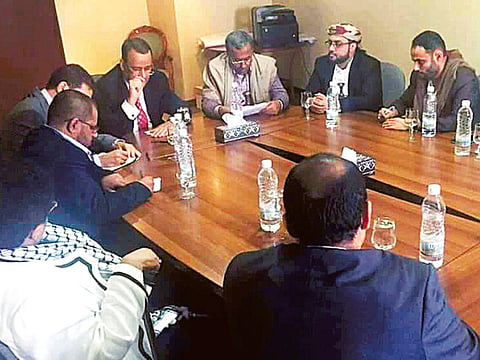Yemen government threatens to quit peace talks
Mutual mistrust has overshadowed eight weeks of UN-brokered talks in Kuwait that have failed to achieve any major breakthrough

Kuwait: Yemen’s warring parties are struggling to seal a peace deal as mutual mistrust has overshadowed eight weeks of UN-brokered talks in Kuwait that have failed to achieve any major breakthrough.
Yemen’s foreign minister and the head of the government delegation, Abdul Malek Al Mikhlafi, told Sky News Arabia that nothing has been achieved since the talks began on April 21 and “we have been revolving in a vacuum”.
He went further, threatening to pull out of the talks in a week’s time if Al Houthis “continue to reject peace”.
The war in Yemen pitting Iran-backed Al Houthi militants and their allies against pro-government fighters backed by a Saudi-led Arab coalition has cost more than 6,400 lives since March 2015.
Another 2.8 million people have been displaced and more than 80 percent of the population are in urgent need humanitarian aid, according to UN figures.
UN envoy Esmail Ould Shaikh Ahmad has urged Yemen’s rival parties to “make concessions” insisting that “failure is not an option” in the talks.
But a Western diplomat closely following the meetings told AFP of “persistent mutual distrust” between the warring sides.
The government’s Gulf Arab backers, mainly Saudi Arabia, have given their vocal backing to a peaceful settlement in Yemen.
After arduous consultations with the negotiators and diplomats from countries sponsoring the talks, the UN mediator in early June drafted a three-point peace plan he submitted to the delegates, according to government and diplomatic sources.
The plan calls for scrapping the rebels’ “constitutional declaration” announced in February last year under which Al Houthis dissolved the government and parliament and formed their own Supreme Revolutionary Committee to rule Yemen.
A military commission would be formed to oversee the rebels’ surrender of heavy and medium weapons they have seized and withdrawal from parts of the country they overran, including Sana’a which has been under their control since September 2014.
Also under the plan, the government - which has moved to the main southern city Aden - would return its headquarters to Sana’a “within two months”, while President Abd Rabbo Mansour Hadi would declare a general amnesty.
Hadi’s government would be replaced by a “national partnership government”, paving the way for the resumption of the political process for a two-year transitional period, under the plan.
In a bid to achieve rapprochement, the UN envoy had tried to push the two sides to release half of all their prisoners before the Muslim fasting month of Ramadan, which began on June 6.
Al Houthis have announced the release of 187 prisoners and Saudi Arabia, which backs Hadi’s administration, said last week it freed 52 prisoners.
Direct negotiations, which resumed on Monday after an almost two-week interruption, were focused on “security and military issues”, Ould Shaikh Ahmad said Wednesday.
“The gap remains wide between the two sides,” another Western diplomat told AFP.
The head of the Al Houthi delegation, Mohammad Abdul Salam, told Yemeni media late Tuesday that they would reject any deal that does not include their input on the makeup of the transitional body.
“Any deal that does not meet our demands on forming a consensual authority... will be rejected,” Abdul Salam said.
This should include Al Houthi agreement on the president, the national unity government and military and security committees, he said.
The government has resisted proposals for a unity administration with the rebels, fearing it would undermine the international legitimacy of Hadi.
But despite the lack of a breakthrough, both parties want to continue to negotiate and “10 of the 18 countries sponsoring the negotiations have promised to provide guarantees for any peace settlement”, according to a diplomatic source.
Sign up for the Daily Briefing
Get the latest news and updates straight to your inbox



